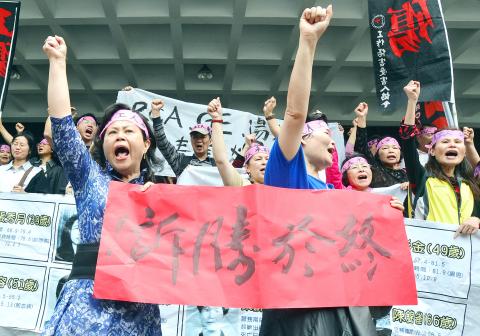Former employees of Radio Corp of America (RCA) burst into tears as a court yesterday ordered that the now-defunct electronics company and its owners pay NT$564.45 million (US$18.11 million) in damages to 445 former workers and their families.
With pink banners around their foreheads saying “RCA workers never give up,” about 60 members of the RCA Self-Help Association cheered their victory after the Taipei District Court handed down the ruling on the decade-long legal battle in what has been described as the worst industrial disaster in the nation’s history.
“During my time at RCA, we were often exposed to organic solvents. No one knew whether the substances were hazardous to our health,” said Huang Chun-tiao (黃春窕), 56, who was diagnosed with nasopharyngeal cancer after working at RCA for 18 years.

Photo: Wang Yi-sung, Taipei Times
According to the verdict, the defendants asserted that the plaintiff had failed to prove that the health issues resulted from exposure to environmental factors, but judges opined that the causal relationship could be determined with “a reasonable degree of medical certainty” to be the toxicity of the organic solvents.
RCA operated in Taiwan from 1970 to 1992, with plants in then-Taoyuan County, Hsinchu County, and Yilan County, employing tens of thousands of people in the production of color TVs and other electronics products using up to 31 kinds of organic solvent, including trichloroethylene and tetrachloroethene, exposure to which increases the risk of cancer, the verdict said.
In 1998, the Environmental Protection Administration (EPA) found that the site of the former RCA plant in Taoyuan was contaminated with chlorinated organic solvents and other toxic chemicals used in its production after the company had illegally dug wells to discharge the toxic waste, which contaminated tap water used by its workers and nearby residents.
The 7.2 hectare plant has been designated by the EPA as a site of “permanent contamination.”
During the period between 1992 when RCA shut down its plants in Taiwan and 2004 when 519 members of the association filed the civil lawsuit, more than 1,300 of RCA’s former employees have been diagnosed with various types of cancer, with 221 of them dying, the verdict said.
A year after the takeover of RCA by General Electric (GE) in 1986, the firm was sold to Thomson Consumer Electronics, the US subsidiary of France-based Thomson Multimedia, which is now called Technicolor SA.
The RCA Self-Help Association had sought damages of NT$2.7 billion from RCA, GE and Thomson, but the court absolved GE of any blame, a decision over which Joseph Lin (林永頌), the lead lawyer for the association, expressed regret.
Lin thanked the judges for determining that the effects of the pollutants caused the diseases, a rare decision in a Taiwanese case.
The defendants have the right to appeal the Taipei District Court’s verdict.

AGING: As of last month, people aged 65 or older accounted for 20.06 percent of the total population and the number of couples who got married fell by 18,685 from 2024 Taiwan has surpassed South Korea as the country least willing to have children, with an annual crude birthrate of 4.62 per 1,000 people, Ministry of the Interior data showed yesterday. The nation was previously ranked the second-lowest country in terms of total fertility rate, or the average number of children a woman has in her lifetime. However, South Korea’s fertility rate began to recover from 2023, with total fertility rate rising from 0.72 and estimated to reach 0.82 to 0.85 by last year, and the crude birthrate projected at 6.7 per 1,000 people. Japan’s crude birthrate was projected to fall below six,

Conflict with Taiwan could leave China with “massive economic disruption, catastrophic military losses, significant social unrest, and devastating sanctions,” a US think tank said in a report released on Monday. The German Marshall Fund released a report titled If China Attacks Taiwan: The Consequences for China of “Minor Conflict” and “Major War” Scenarios. The report details the “massive” economic, military, social and international costs to China in the event of a minor conflict or major war with Taiwan, estimating that the Chinese People’s Liberation Army (PLA) could sustain losses of more than half of its active-duty ground forces, including 100,000 troops. Understanding Chinese

US President Donald Trump in an interview with the New York Times published on Thursday said that “it’s up to” Chinese President Xi Jinping (習近平) what China does on Taiwan, but that he would be “very unhappy” with a change in the “status quo.” “He [Xi] considers it to be a part of China, and that’s up to him what he’s going to be doing, but I’ve expressed to him that I would be very unhappy if he did that, and I don’t think he’ll do that. I hope he doesn’t do that,” Trump said. Trump made the comments in the context

SELF-DEFENSE: Tokyo has accelerated its spending goal and its defense minister said the nation needs to discuss whether it should develop nuclear-powered submarines China is ramping up objections to what it sees as Japan’s desire to acquire nuclear weapons, despite Tokyo’s longstanding renunciation of such arms, deepening another fissure in the two neighbors’ increasingly tense ties. In what appears to be a concerted effort, China’s foreign and defense ministries issued statements on Thursday condemning alleged remilitarism efforts by Tokyo. The remarks came as two of the country’s top think tanks jointly issued a 29-page report framing actions by “right-wing forces” in Japan as posing a “serious threat” to world peace. While that report did not define “right-wing forces,” the Chinese Ministry of Foreign Affairs was